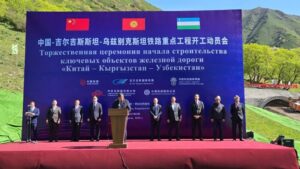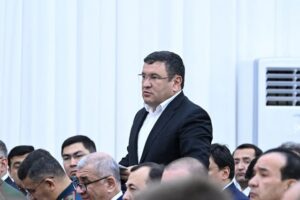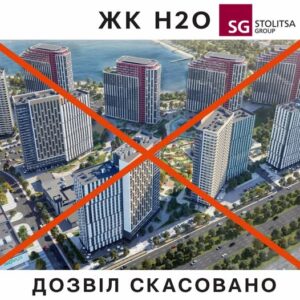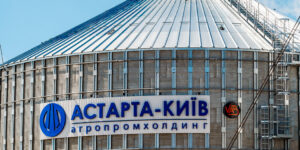
In the Suzak district of the Jalal-Abad region of Kyrgyzstan, construction has officially begun on major railway facilities for the China-Kyrgyzstan-Uzbekistan railway.
As part of the construction of this railway, three tunnels with a total length of over 10 km are planned to be built, including: Tunnel No. 1 Naryn (Jaman-Dawan) – 12.5 km; Koshtoba (Kazarman) tunnel – 13.2 km; Fergana mountain tunnel – 12.2 km. The total length of this railway project is 532.53 km.
CHINA, CONSTRUCTION, KYRGYZSTAN, RAILWAY, tunnels, UZBEKISTAN

Large-scale investment projects in the chemical industry are planned in the Khorezm region of Uzbekistan, which are expected to transform this industry into one of the key drivers of economic growth in the region. This was announced by the press secretary of the President of Uzbekistan during a meeting in the Urgench district.
This year, the first phase of the construction of a $10 billion gas chemical complex will begin in the Tuprakkalinsky district, which will use MTO (methanol-olefin) technology. Upon completion of the project, the complex will annually produce 14 types of basic polymer products with high added value and a total capacity of up to 2 million tons.
The project was first announced in March last year during the Head of State’s visit to the region. At that time, Shavkat Mirziyoyev held a working meeting with the leadership of the Ministry of Energy, Uzkimyosanoat, and a large foreign investment company, whose name was not disclosed.
It was expected that the future production facilities would be able to produce up to 2.5 million tons of products per year and create about 3,000 jobs. The project is scheduled for implementation in 2024–2028.
In addition, a 10-hectare chemical technology park will be created in the Khazarasp district, where projects worth $100 million will be implemented for the production of polymer products.
Special attention was paid to the region’s construction industry. Last year, 663 enterprises in Khorezm produced building materials worth about $86.6 million. To further develop this segment, 40 new projects with a total value of $100 million are planned for implementation in 2025, which will increase production to about $118.1 million.

In 2025, Ukraine’s construction industry is showing signs of recovery and growth, despite the ongoing challenges posed by the aftermath of military operations and economic instability. Below are the key aspects of the current state of the industry and forecasts for the near future.
Statistics and current indicators
GDP from construction: According to Trading Economics, in the fourth quarter of 2023, the GDP from construction in Ukraine reached UAH 42,540 million, which is a historical high. The forecast for the end of the first quarter of 2025 is UAH 44,029 million, with further growth to UAH 46,899 million in 2026.
Residential construction: In 2024, 1.41 million square meters of housing was built in Kyiv, accounting for 14.5% of the total volume in the country. Kyiv region is the leader with 1.95 million square meters (19.9%). Lviv region is also active with 1.06 million sq m (10.9%).
Key trends
Restoration of infrastructure: Active restoration of damaged infrastructure continues, especially in the eastern and southern regions. In Zaporizhzhia region, more than 600 residential buildings will be restored in 2025, and another 200 are planned by the end of the year.
Rising prices for construction materials: In 2024, prices for basic construction materials increased significantly due to logistical difficulties, rising energy prices, and inflation. In 2025, prices are expected to rise further, although stabilization is possible if logistics improve and local production increases.
Demand for energy-efficient and modular buildings: Ukrainians are increasingly choosing energy-efficient homes that help reduce heating and electricity costs. In 2025, houses with solar panels, insulated facades and autonomous energy supply systems will remain popular. Demand is also expected to grow for modular houses, which can be built quickly and at a relatively low cost.
Government support: The eHouse program continues to stimulate demand for housing. In 2024, the program provided UAH 14.6 billion in mortgage loans, up 66% from 2023. In 2025, funding in the amount of UAH 18 billion is planned.
Digitalization of the industry: In 2025, construction companies will be more actively implementing BIM modeling, drones for facility monitoring, and digital project management platforms, which will help reduce costs and improve the quality of work.
Main challenges
Shortage of skilled workers: Mass migration has led to a shortage of skilled workers. Companies are looking for ways to attract workers, including raising salaries and training.
Bureaucratic difficulties: The process of obtaining construction permits continues to be time-consuming. Simplifying the regulatory framework could have a positive impact on the market.
Financial risks: High inflation and hryvnia volatility may slow down the pace of construction. Companies are looking for new financing mechanisms, including cooperation with international investors.
Forecasts for 2025
Rising housing prices: According to forecasts, in 2025 the cost of housing in new buildings may increase by 15-25%, especially in large cities. This is due to rising construction costs, inflation, and high demand for new buildings.
Regional development: Kyiv, Kyiv and Lviv regions are likely to remain the leaders, but Zakarpattia and Ivano-Frankivsk regions may increase their share due to tourism and demand from internally displaced persons.
Investment and competition: Attracting investment and increasing the competitiveness of construction companies will be key factors in the development of the industry. Companies able to quickly adapt to changes and optimize processes will gain an advantage in the market.

The Volyn District Administrative Court upheld the claim of the Osokorki Ecopark public organization and decided to revoke the construction permit issued to Kontaktbudservis LLC and Budevolutsia LLC for the construction of a residential complex. The developer Stolitsa Group announced its intention to appeal the decision.
“On April 25, 2025, the Volyn District Administrative Court revoked the construction permit issued to Kontaktbudservis LLC for the territory of the Osokorky Ecopark. We have once again proven that construction on the territory of the ecopark is illegal. The court’s decision revoked the construction permit for the H2O residential complex,” the Osokorky Ecopark public organization said on Facebook on Tuesday.
According to the published court decision, the court concluded that the defendant did not provide the results of an environmental impact assessment to obtain a construction permit in a protected landscape area, did not coordinate the construction project with the State Service for National Cultural Heritage and the Ministry of Culture of Ukraine, and did not coordinate the construction plans with the current General Plan of the city.
Thus, the court’s decision revoked the permit of the State Architectural and Construction Inspection of Ukraine (GASI) No. IU113181171313 dated April 27, 2018, for the comprehensive development of microdistricts 1, 2, and 2a of the Osokorki-Tsentralni residential area in the Darnytskyi district of Kyiv.
In turn, the project developer Stolitsa Group announced its intention to appeal this decision in the near future. In its opinion, the court assessed the case as insignificant and did not take into account previous decisions of the Supreme Court regarding urban planning conditions and the detailed plan of the territory in this case.
“The company considers the decision of the Volyn District Administrative Court of First Instance to be a gross violation of procedural and substantive law, and it has not entered into legal force and will be appealed in the near future,” the company said in a statement on its Telegram channel.
The developer emphasized that work on the construction site is being carried out in accordance with the approved schedules and commitments made to buyers. In addition, the company continues to fulfill its obligations under the signed memorandum on the completion of the bankrupt Arkada facilities, the statement said.
As reported, in November 2018, the Kyiv District Administrative Court dismissed the claim of the Osokorki Ecopark public organization to revoke the State Architectural and Construction Inspection’s permit for the construction of the Patriotika na Ozerakh residential complex in the Osokorki-Tsentralny residential area in the Darnytskyi district of Kyiv, issued to Kontaktbudservis LLC and Budevolutsia LLC. This decision was overturned on appeal in 2019, and later in 2020, the Supreme Court overturned both decisions and sent the case back for reconsideration.
In 2019, Kyiv City Council deputies supported the decision to create the Tyaglo Lake Landscape Reserve to preserve valuable natural complexes of flora and fauna in the Dnipro floodplain on the left bank of the capital.
Later in 2021, a memorandum was signed on the completion of the bankrupt Arkady’s projects by Stolitsa Group LLC: the Eureka, Patriotika, and Patriotika na Ozerakh residential complexes.
On January 20, 2025, Stolitsa Group opened sales in the N2O residential complex in the capital’s Osokorki district between the Tyaglo and Nebrezh lakes (the former Patriotyka na Ozerakh project from Arkada). The chief architect of the project was Alexei Kutsalo from KUB Arkhteks.
Sources: https://reyestr.court.gov.ua/Review/126877273, https://www.facebook. com/ecoparkosokorky/posts/pfbid02HQ1SYBsTGKpcNfUFTqxpupRE2geJcpc7KDGbk29UxxGb688zAikndaggEAwWy5gol, https://t.me/stolitsa_group/2564

The construction of the Chernivtsi-Suchava (Romania) European railway will begin in 2026, and a feasibility study is being prepared, Deputy Finance Minister Oleksandr Kava said.
“Under an optimistic scenario, construction of the European railway to the city of Chernivtsi (from Suceava, Romania – IF-U) may already begin next year… A feasibility study is currently being prepared for the project. Chernivtsi has the opportunity to become the second regional center after Uzhhorod to get access to the European gauge directly in the city,” Kava said at the conference ‘Logistics as a Driver of Economic Growth’ organized by the We Build Ukraine think tank.
According to him, the construction of the Chop-Uzhhorod European railway is currently underway, funded 50% by Connecting Europe Facilities (CEF) and 50% by the state budget.
The launch of this Euro-gauge is planned for the summer of 2025, Kava said.
“This (Chop-Uzhhorod European railway – IF-U) will not only allow to launch direct passenger trains from Uzhhorod to Budapest, Bratislava, Prague, Vienna, Dresden, but will also enable shippers operating in Uzhhorod to send goods via the European railway to partners in Europe and also receive goods, containers and materials from European countries directly to Uzhhorod,” the deputy minister said.
Earlier it was reported that Ukrzaliznytsia JSC (UZ) made temporary changes to the schedule of a number of passenger trains heading to Uzhhorod until the end of July due to large-scale work on laying a European standard track between Chop and Uzhhorod.
At a meeting with European Commissioner for Sustainable Transport and Tourism Apostolos Tsitsikostas, Vice Prime Minister for Reconstruction of Ukraine and Minister of Community and Territorial Development Oleksiy Kuleba said that direct European gauge rail service to Uzhhorod would be launched in the second half of 2025.

The board of directors of Astarta, Ukraine’s largest sugar producer, has approved a decision to start construction of an oilseeds processing plant, including soybeans and rapeseed, in Khmelnytsky region, in which it will invest $76 million, the company’s press service reports on Facebook.
According to the report, the planned capacity will be 400 thousand tons per year. It is scheduled to be commissioned in 2026.
“Astarta continues to strengthen its position in the processing sector by investing in new production facilities. The growing demand for soybean products in the EU opens up new opportunities, and we are ready to realize them using our experience and expertise.
The new oilseed processing plant will allow us to expand the range of ingredients for the feed base,” said Vyacheslav Chuk, Astarta’s Chief Commercial and Strategic Marketing Officer.
The agroholding noted that the project envisages the efficient use of the existing infrastructure of the agro-industrial holding and will contribute to the development of the agro-industrial ecosystem in the Western region.
“The Astarta team is already actively working on its implementation. Just today we have finalized the agreement with the manufacturer of the extraction equipment and technology. We are waiting for the decision of the Narkevytska territorial community to allocate land for the project. According to our experts, this project meets the requirements of the law “On State Support for Investment Projects with Significant Investments in Ukraine”, so we intend to apply for participation in the program to speed up its implementation,” Chuk added.
“Astarta is a vertically integrated agro-industrial holding company operating in eight regions of Ukraine. It includes six sugar factories, agricultural enterprises with a land bank of 220 thousand hectares and dairy farms with 22 thousand cattle, an oil extraction plant in Globyno (Poltava region), seven elevators and a biogas complex.
In 2023, the agricultural holding reduced its net profit by 5.0% to EUR61.9 million, and its EBITDA decreased by 6.1% to EUR145.77 million, while revenue increased by 21.3% to EUR618.93 million.
“In January-September 2024, Astarta increased its net profit by 35.1% to EUR75.60 million, EBITDA by 12.8% to $131.56 million, with revenue up 12.6% to EUR441.46 million.